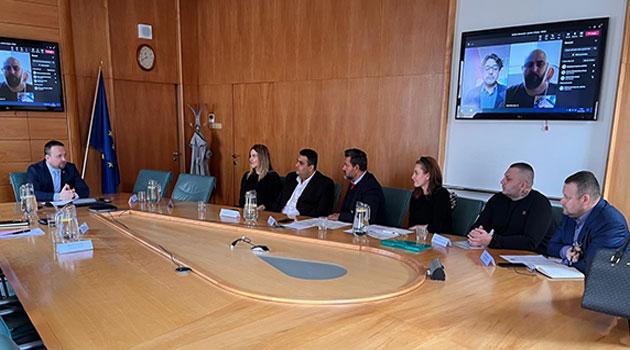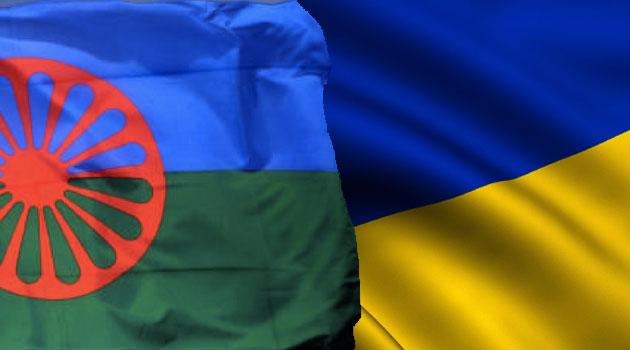RomanoNet representatives meet with Czech Interior Minister and Labor Minister about the Romani refugees from Ukraine

Representatives of the RomanoNet umbrella organization met earlier this week with Czech Interior Minister Vít Rakušan and yesterday with Czech Labor and Social Affairs Minister Marian Jurečka; another meeting is also planned at the Education Ministry. All of these meetings are about current aid to refugees from Ukraine and how to combine it with existing work by nonprofit organizations providing a broad range of assistance, above all to the Romani community.
“The meeting at the Labor and Social Affairs Ministry was concentrated on how to effectively target our energy and efforts in relation to refugees from Ukraine,” Nikola Taragoš, director of the Romodrom organization, said in an interview for ROMEA TV. “We discussed the type of interventions and how to most quickly get support for them.”
“Our support is focused more generally, not just on Romani people, but naturally, like other pro-Romani and Romani organizations, we will also be able to specialize in the Romani people who are part of this big set of those in need. It is important to say that the Labor and Social Affairs Ministry is ready to amplify and accelerate all processes so that support for the nonprofit sector, and thereby in the field, will come as fast as possible,” the Romodrom director added.
Alena Gronzíková of the IQ Roma servis organization confirmed that in the South Moravian Region, NGOs have noted that Romani refugees from Ukraine are being treated differently and worse than are white refugees. “In the South Moravian Region we have unfortunately recorded problems with accommodating Romani people from Ukraine, the public simply does not want to house Romani refugees,” Gronzíková said, adding that while individual cases of discrimination were not discussed during the meeting, what was discussed were formats for mediating the coexistence of non-Romani and Romani refugees from Ukraine as well as the coexistence of Romani refugees from Ukraine with the Czech public.
The area of housing was also a subject of the meeting between Czech Interior Minister Vít Rakušan and representatives of RomanoNet. “We discussed the area of the housing that the Refugee Facilities Administration will facilitate and how it will be connected to social services,” the Romodrom director explained to ROMEA TV.
RomanoNet is an umbrella organization in which 11 nonprofit organizations are currently associated that provide different forms of support to Romani people in the Czech Republic first and foremost. According to the Romodrom director, the RomanoNet organizations are currently working with more than 500 Romani refugees from Ukraine.
“The total number of Romani refugees from Ukraine is estimated at 1 200. That means we are working with approximately half of those people in different locations,” Taragoš told ROMEA TV.
“These are families with many members, roughly two-thirds of whom are children under the age of 15, and then they are either women or senior citizens of both sexes over the age of 65. That means actually their male family members of productive age, the young men, remained in Ukraine and were drafted into the Army,” Taragoš said.
Since the beginning of the war, the Czech Republic has issued more than 269 000 special visas to those affected by Russia’s invasion of Ukraine; the actual number of refugees from Ukraine residing in the Czech Republic is probably higher than that. At the beginning of last week, Czech Prime Minister Petr Fiala (Civic Democratic Party – ODS) said there are roughly 300 000 refugees in the country.
The number of such visas issued during the last two weeks has declined. On the basis of visas issued for temporary protection purposes, Ukrainian citizens are allowed to reside in the Czech Republic for up to one year.
Such persons are allowed to access public health insurance, education, the labor market and are eligible for other assistance, for example, when finding housing. The RomanoNet umbrella organization was created in February 2017 for the purpose of coordinating the collaboration of non-governmental, nonprofit organizations working in the Czech Republic with the Romani minority.
Its mission is to advocate for an inclusion policy emphasizing respect for human rights, equality, the participation of Romani people in public life, and their involvement in decision-making processes. The member organizations of RomanoNet are Awen Amenca, IQ Roma servis, Khamoro, Kleja, Otevřená společnost, Romano jasnica, ROMEA, Romodrom, Slovo 21, Společně-Jekhetane and Life Together (Vzájemné soužití).
